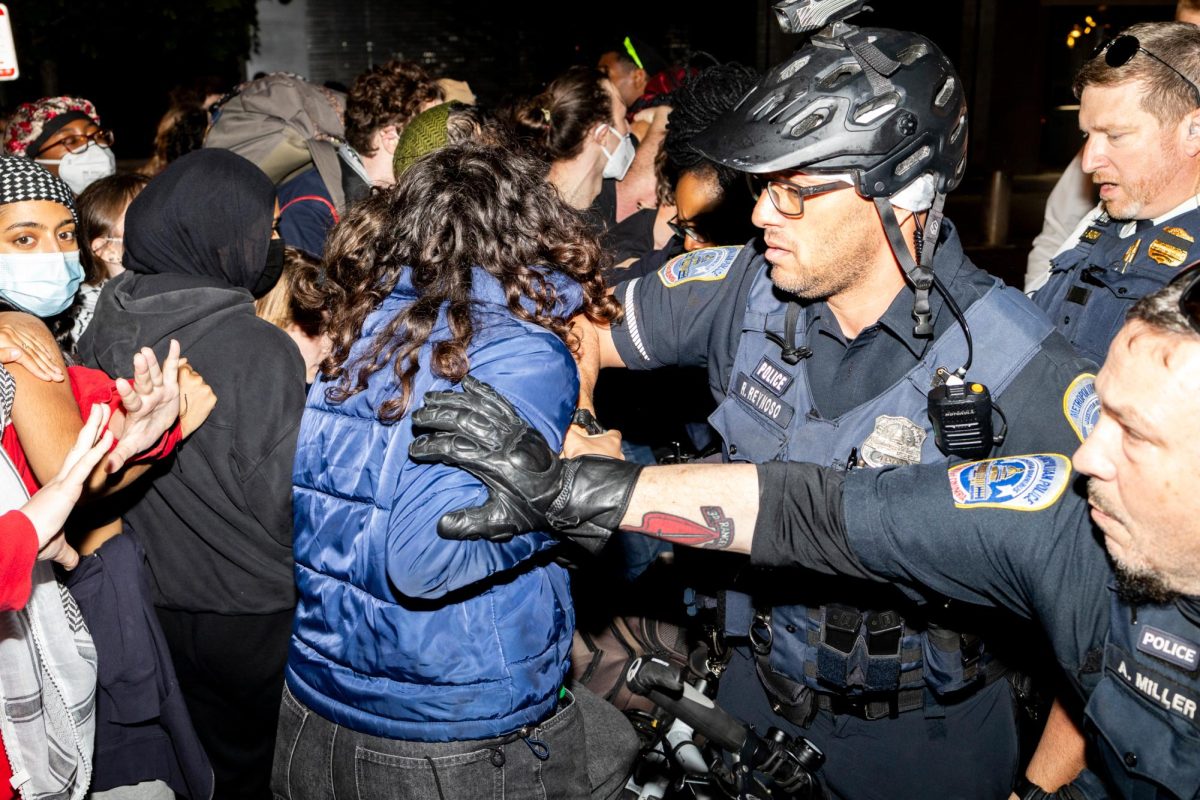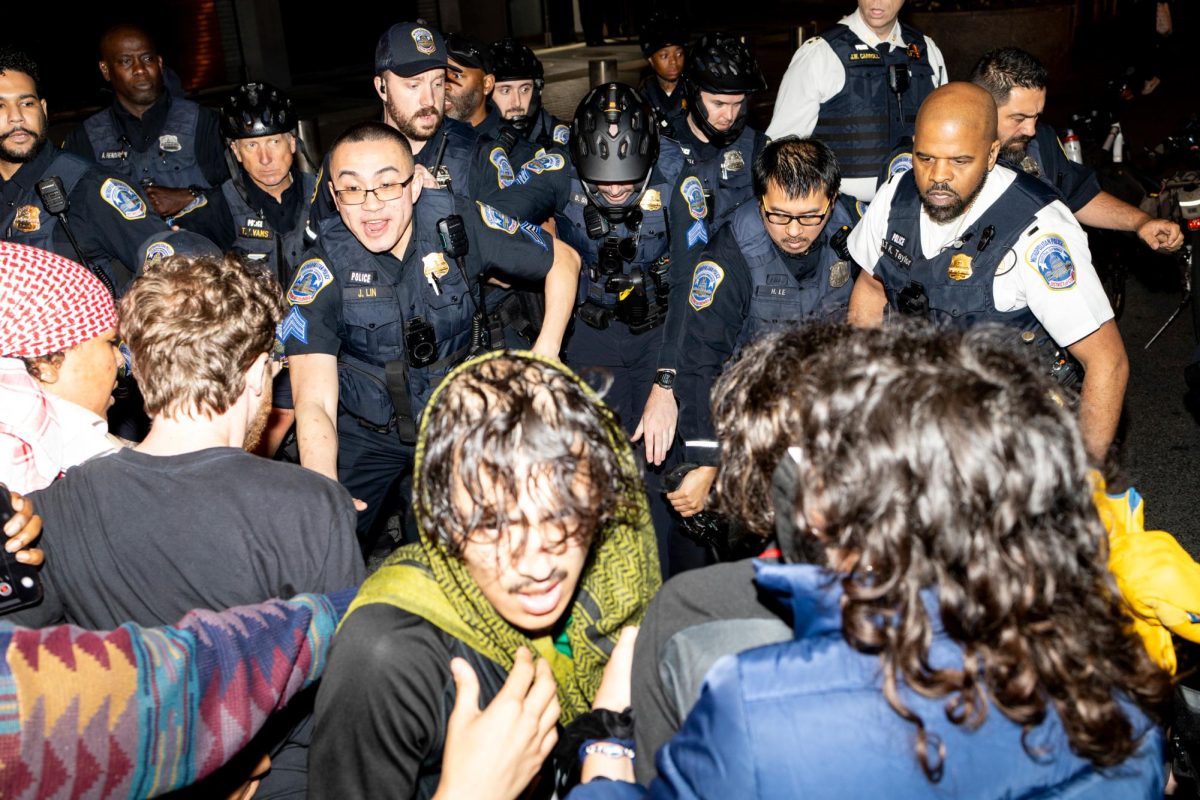Updated: March 20, 2024, at 4:20 p.m.
A transfer student and former member of American University’s student government became the first to announce a bid for the Student Government Association vice presidency Tuesday.
Junior Aly McCormick, who studies political communication and transferred from American in the fall, said if elected, she plans to connect students and administrators through town hall meetings, expand the SGA’s financial transparency and advocate for campus sexual violence prevention. McCormick said she has experience representing students as the speaker in American’s Undergraduate Senate and the current vice president of communications for GW Students Against Sexual Assault but remains removed from the SGA’s “political issues” as a newcomer to the body.
McCormick said as vice president presiding over the SGA Senate, she plans to advocate for town hall meetings with administrators where the student body can voice concerns on issues like the quality of food and hours of operation at campus dining halls and officials can explain any University changes, like tuition increases.
“Something I really care about is students being able to access the SGA,” McCormick said. “Because at the end of the day, in my opinion, student government is supposed to be an advocacy force, not like a political force. It shouldn’t be a house of cards game.”
Last year, SGA Vice President Demetrius Apostolis campaigned on hosting meetings between students, SGA leadership and administrators two to three times per semester to deliver student feedback on tuition increases, curriculum requirements and University spending.
This term, GW Police Department Chief James Tate and Director of Student Rights and Responsibilities Christy Anthony each attended SGA Senate meetings — which are open to the public — to discuss the University’s plan to arm some campus police and revise the Code of Academic Integrity to more efficiently resolve academic integrity violation cases, respectively.
McCormick said students are turned away from the SGA’s bureaucracy, which makes the body feel like an “insiders club” that dissuades student engagement. She said she’s noticed an exclusive culture among SGA members while attending meetings in the public section this year, adding that her lack of prior experience serving in the body prevents her from getting roped up in its politics.
“I understand the apathy towards student government so much,” she said. “I had it. When I first came here, I was a little shocked.”
McCormick added that she would allow students to attend all SGA Finance Committee meetings, which she believes would ensure that general allocations are an “open conversation” instead of an exclusively bureaucratic process. Student groups can present their funding needs to the committee — which is responsible for dividing up funds — and access the minutes that document its discussions and decisions, but can’t attend every committee meeting in person, including those where members consider funding requests and finalize allocations.
Former SGA Treasurer Arya Thakur, who ran for vice president last spring, campaigned on opening senate committee meetings to all student body members.
McCormick said she also plans to include student group leaders in conversations about general allocations to clarify the way the SGA divvies up funds to student organizations. She said she’s heard student organizations often don’t receive explanations for why the SGA doesn’t allocate the full amount that the groups requested, which is “discouraging.”
During the last allocations cycle in December, student organizations requested a total of more than $1.3 million from the SGA in funding requests for the spring semester, but the SGA only had a budget of $265,787 for general allocations to all the groups.
Last February, the Finance Committee held informational sessions on the allocations process. SGA President Arielle Geismar said during her campaign last spring that she would audit the process and host training sessions for student groups.
“I understand a lot of orgs aren’t thrilled with the finances that they get, and that’s something that I care a lot about,” McCormick said. “Because even if they’re not getting the money they want, they should at least understand why and be able to talk about it.”
McCormick said she wants to increase SGA election voter turnout — which dropped last year to a low not seen in at least a decade — through conversations with students by explaining the SGA’s role in doling out more than $1.3 million in student organization funding and lobbying with administrators. She said her conversations with students during her campaign would emphasize why they should care about this SGA election instead of just why they should vote for her.
“I understand that you might not want to vote, 8 percent voter turnout is not promising,” McCormick said. “Whether you like it or not, the SGA does get a lot of funding, and that funding can go to a lot of really good places. And there’s a lot of really good advocacy work that we can be doing to improve your lives.”
McCormick said she would use the SGA’s second-highest office to support survivors of sexual violence on campus, including by working to implement a survivors’ bill of rights at GW, which would list the rights the University must grant to sexual assault survivors. She said the bill will ensure the rights of student survivors of sexual assault are upheld when pursuing the Title IX process, resembling similar legislation passed during her time in American’s student government.
GW’s Office of Advocacy and Support also outlines rights for community members who are the victim of a crime on their website, which include access to a Title IX adjudication process and the rights afforded by Title IX policy.
McCormick said she’s heard of GW students being dissuaded from reporting violations to Title IX and noticed a stigma surrounding sexual violence, which she believes University administration can combat by better supporting survivors. Officials reformed the Title IX Office in December 2021, adding additional training measures and staff positions, after students alleged the office mishandled sexual assault cases earlier that year.
“If something were to go awry throughout the, hypothetically, the Title IX process, they know exactly what they’re entitled to and can self-advocate,” McCormick said.
Candidate registration for the SGA election closes March 26. McCormick must collect at least 379 signatures from students — which will then be verified by the Joint Elections Commission — before she will officially be on the ballot. The commission will hold the election on April 11 and 12.
This post was updated to clarify the following:
This post was updated to clarify that the SGA had a budget of $265,787 for spring general allocations.





